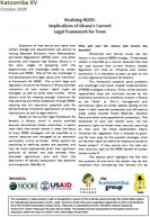Realising REDD
Implications of Ghana's Current Legal Framework for Trees
By Katoomba Incubator View PublicationChallenges associated with tree tenure and property rights, while very important, should not be seen as complete barriers to initial REDD‐Plus initiatives. Efforts to introduce REDD projects in rural communities and landscapes in Ghana should move forward, particularly in consideration of the following points:
Lead by example: harnessing REDD compatible structures and legislation, such as CREMAs or legal limits on logging in off reserve areas, can help inform the national REDD strategy and implementation debate.
Different options exist for how carbon ownership rights may be defined, but the question of benefit‐sharing and distribution may be more critical than carbon ownership per se.
A/R options provide a very strong platform for initial efforts because ownership and benefit‐sharing are clearly defined, so that the permanence risks are greatly reduced.
Areas where logging is not practiced or is less common may be appropriate places to develop and test the implementation of carbon tree rights through the creation of District Assembly bye‐laws.
REDD‐Plus policies should favor the land users – it should be recognized that reforming tree tenure would result in more powerful incentives for farmers to retain trees than carbon finance alone.

